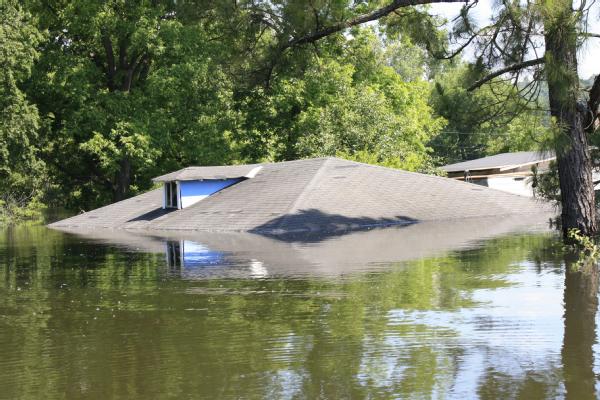
The New Normal: Deluge

Marlene Cimons of Climate Nexus contributed this article to LiveScience’s Expert Voices: Op-Ed & Insights.
Floodwaters surged this week in the Midwest following torrential rains and snow, closing portions of the Mississippi River, which only months ago stood at record lows. The resulting flooding killed three people — and possibly two more — and closed roads and bridges, including sections of major highway. The swollen river also tore 114 barges loose near St. Louis; four of them hit the Jefferson Barracks Bridge in St. Louis County, 10 of them sunk, and another two couldn’t be found.
The three confirmed victims — two in Indiana and the third in Missouri — were killed when flash floods carried their cars off the road. One of the victims still being investigated was discovered in a creek in Illinois and the other in the Mississippi River, probably also the result of high waters. And it’s not over yet. Some spots along the river still haven’t crested, and more rain is forecast for the coming days. [Major Flooding Continues From Missouri to Michigan]
It is a disturbing scenario — drought or deluge — that has become all too familiar in recent years, and comes as no surprise to climate scientists.
"When it rains, it's going to pour," said Michael Oppenheimer, professor of geosciences and international affairs at Princeton University, and a longtime participant in the U.N. Intergovernmental Panel on Climate Change. "We will be getting more of those, and those are the types of events that can be highly damaging, very disruptive and can cause real trouble."
To be sure, it is still unclear to what extent global warming is responsible for any single rain or flooding event. But it almost certainly has "a direct influence … on precipitation," said Kevin Trenberth, distinguished senior scientist in the climate analysis section at the National Center for Atmospheric Research (NCAR).
"We can talk about it in terms of changing odds, as many others have done," he said. "The odds have increased for these kinds of extremes to occur ... We have a new normal. The environment in which all weather events occur is different than it used to be."
Get the world’s most fascinating discoveries delivered straight to your inbox.
Increased heating leads to greater water evaporation; the water-holding capacity of the air rises about 7 percent with each degree Celsius of warming, producing air that is supersaturated with water, bringing heavy and intense rainfall — often followed by floods.
Worldwide, floods cause billions of dollars in damage, with thousands of lives lost. In fact, flooding causes more deaths in the United States than any other weather event except heat. [Why You Are Paying for Everyone's Flood Insurance: Op-Ed]
"The rainfall will be more intense for a given event," said Gerald "Jerry" Meehl, a senior scientist at NCAR. "We've already seen it. It's been happening and is projected to continue to happen as we get warmer in the future."
Floods occur when thunderstorms, tropical storms or hurricanes deliver more rain to a drainage basin than it can absorb or store readily. Also, a midwinter thaw or an early spring can produce large amounts of runoff from melting snow in a short period of time. Ground that still is hard and frozen can't absorb the water, which runs off the surface and into lakes, streams and rivers, causing excess water to spill over the banks.
There has been no letup in serious floods worldwide. In recent years, the United Kingdom has had serious floods, as has China and the Philippines. In Russia's Krasnodar region, which will host the 2014 Winter Olympic Games in the Black Sea resort of Sochi, floods killed more than 170 people last year.
Last year, seven years to the day after Hurricane Katrina made landfall, Hurricane Isaac slammed into Louisiana with 70-mph winds and heavy rain, causing widespread flooding and leaving at least 200,000 without power and thousands of people in shelters. [Perfect Storm: Climate Change and Hurricanes: Op-Ed]
In 2011, catastrophic flooding from Hurricane Irene decimated areas of New York, Connecticut, Vermont and elsewhere, causing $15 billion in flood damage. Moreover, future hurricanes likely also will deliver considerably more rain than in the past.
"Irene formed over unusually warm waters and picked up a lot of moisture," said Michael Mann, professor and director of the Earth System Science Center at Pennsylvania State University. "Because of those record ocean temperatures, Irene was working with a much higher amount of water vapor in the atmosphere than we normally would have. That’s why we saw the record flooding in New England, Vermont and Massachusetts."
In the case of Katrina, NCAR's Trenberth believes as much as 10 percent or more of the rain was due to higher sea surface temperatures and more water vapor in the atmosphere. "That’s probably conservative," he said.
Not long ago, a group of climate scientists concluded it was likely that human-induced climate change fueled the devastating floods that struck England and Wales in the fall of 2000, damaging nearly 10,000 properties and causing an estimated $2 billion in losses.
They used a detailed computer climate model from the United Kingdom's Met Office to simulate fall 2000 weather, first in a world as it actually was at that time, and then in a parallel world without 20th-century greenhouse gases. They ran the simulations thousands of times, and found that the odds increased by double or more in a world altered by climate change.
"In nine out of 10 cases, the models indicated that climate change raised the risk by more than 20 percent, and in two out of three cases, by more than 90 percent," said Pardeep Pall, a computer systems engineer with the Lawrence Berkeley National Laboratory and lead author of the study, which appeared in the journal Nature in 2011.
"Think of the weather as a roll of the dice, and flood as being a six," he added. "If you roll the dice, you will have a one in six chance of a six happening. But imagine if the dice is somehow loaded toward more sixes. We've loaded the climate toward more sixes."
Read Cimons' Op-Ed: Worst Allergy Season Ever?
The views expressed are those of the author and do not necessarily reflect the views of the publisher.
 Live Science Plus
Live Science Plus





